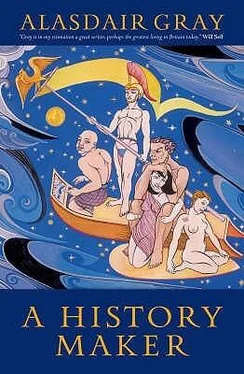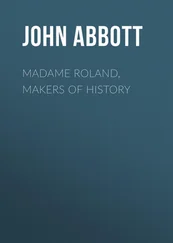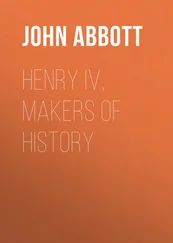OFFICIAL CHRISTIANITY. In the fourth century after Christ the Emperor Constantine saw the political usefulness of a history which promised mankind a happy future if it left the management of the present time to landlords like himself. He made Christianity the Roman imperial religion, officially splitting time into four again:
1 — The prehistoric happy godly garden where life started well but went wrong.
2 — History without hope before Christ.
3 — History with hope after Christ.
4 — The posthistoric happy godly city where hopes come true (if you love God as the rulers and priests tell you).
This Christian division of time lasted over two thousand years, though when famine and administrative collapse made the present unbearable the majority revolted against their priests and landlords and demanded some heaven at once.
THE RENAISSANCE. Around A.D. 1400 some Italian republics and dukedoms so prospered by trade between Asia and Europe that they recovered the Roman sense that people could use intelligence to improve their community. Historians called this recovery the Renaissance and redivided time as follows:
1 — The Ancient World — All time before Christianity became the Roman imperial religion.
2 — The Middle Ages — everything between the Ancient World and the Renaissance; a better time than the Ancient World, because it made Europe Christian.
3 — The Modern World — everything after the Middle Ages but better than these, because with Christian faith in the future modern Europeans were scientists continually enlarging the wisdom of the present, artists continually adding to the world’s stock of beautiful things, traders bringing back rare goods from every continent in the world. Some historians felt so pleased with their part of Europe that they thought history had reached a lasting state of perfection. Bishop Bossuet felt this about Catholic France in the seventeenth century, the French revolutionaries about equalitarian France in the eighteenth, Professor Hegel about Protestant Prussia in the nineteenth.
MARXISM. Yet even in those states folk were excluded from social improvements. Many of the rich lived wastefully with two or three huge houses while labouring families lived in one or two rooms. Landlords kept great fertile parks uncultivated while peasants paid them rents for the right to scratch potatoes out of stony soil. The hardest workers were taxed to pay for wars which left the rich uninjured and did the poor no good, unless a soldier son came home with loot to compensate for his wounds. The development of industrial factories enriched several new classes of people while impoverishing an equal number. In 1867 Karl Marx suggested a new division of time:
1 — Tribal Communism, when people live in communities so small that most families have a voice in the governing council so are seldom much poorer than their richest neighbour.
2 — Class Warfare, when folk live in big states ruled by small unions of conquerors, scribes, landlords, factory owners, businessmen and/or moneylenders. These unions keep power and great incomes by the continual creation of poverty in the underclass.
3 — World Communism, when the underclass form their own unions, take the land and factories from their masters and manage them for the good of themselves, whereupon the evicted upper classes have to join them, riches and poverty vanish in a fair sharing of goods, and all states wither away.
This resembled the Jewish and Christian time division in giving hope for the future, though the future was to be created by human effort instead of God. Many labourers and poor tradesmen in machine-making nations were then forming unions to improve their conditions. In some states they created political parties which helped them do so.
In 1914 an inbred clique of owners who had inherited the Russian Empire went to war. They commanded a vast, obedient, conscripted people but could not give them enough food, boots and bullets to defeat smaller armies of industrially efficient neighbours. This caused a workers’ revolt. A clique of middle-class Marxists rushed back to Russia and seized control in the name of World Communism. The new clique created a party dictatorship which did not share its advantages with other Russians and died of broken promises before the end of the century.
POSTMODERNISM happened when landlords, businessmen, brokers and bankers who owned the rest of the world had used new technologies to destroy the power of labour unions. Like owners of earlier empires they felt that history had ended because they and their sort could now dominate the world for ever. This indifference to most people’s wellbeing and taste appeared in the fashionable art of the wealthy. Critics called their period postmodern to separate it from the modern world begun by the Renaissance when most creative thinkers believed they could improve their community. Postmodernists had no interest in the future, which they expected to be an amusing rearrangement of things they already knew. Postmodernism did not survive disasters caused by “competitive exploitation of human and natural resources” in the twenty-first century.
MODERNISM developed when households became the largest units of government on earth and satellite co-operatives the largest off it. Once again time was split into three.
1 — Prehistory, before people lived in cities.
2 — History, when increasing numbers did so and city cultures shaped family life everywhere.
3 — Modernity, when the open intelligence network and powerplants made cities, nations, money and industrial power obsolete.
The simplicity of our modern divisions misled many into treating history as a painful interval between prehistoric tribal communities and modern co-operative ones. Others wanted to lump the historic and prehistoric eras together with a new calendar dated from the start of modernity, but disagreed about where to place the first year. Open intelligence gurus said the new era opened when the United States government let an early open intelligence network take over the Montana state education service in the 1980s. Others put it in the twenty-first century when the first modern powerplant synthesized a bowl of rice, a Samurai sword and a perfect Hokusai print on a Japanese peninsula — others when the first self-sustaining powerplant community took root in an Israeli kibbutz or in Salt Lake City or in the Vatican — others when the Islamic league began distributing powerplants to every Mohammedan nation on earth — others when the open intelligence network announced an accord with Japan through which it would sell any sixty people in the world their own powerplant if they owned an area of land able to support one.
I will end this far too lengthy note by quoting Pat O’Rafferty, a guru unknown to the open intelligence since he only speaks into the ears of friends: Modern housekeeping and modern gangrelling grew from more than two thousand years of decent people struggling to live as Jesus advised — struggling to do as they would be done by, not as lords and government officials did with them. The fact that Buddha (a former hereditary lord) and Confucius (an ex-government official) said the same centuries before Jesus proves they too were God’s excellent sons. Calendars were invented to help us keep appointments with each other. Using them to cut us off from a host of the dead is like using fire to burn a library instead of keeping it warm.
Page 147.
The public eye presenters and telecom gurus and commanders broadcasting just now seem part of her conspiracy, but so do I.
The epidemic of military enthusiasm following the Ettrick — Northumbria draw was a worldwide male reaction to the omnicompetence of women who only needed them as inseminators. It is impossible to know what damage this epidemic would have done had it not been interrupted by another. The military threat had not been contrived by the conspirators. They merely tried to take advantage of it, fortunately for humanity.
Читать дальше












